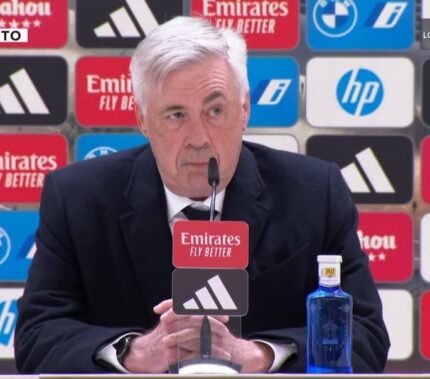Real Madrid has made history by becoming the first football club to generate over €1 billion in annual revenue, according to Deloitte’s latest Money League report. The Real Madrid secured their position at the top of the rankings for the 2023-24 season, a year in which they won both La Liga and the UEFA Champions League.
Real Madrid’s Financial Dominance and Revenue Breakdown
Real Madrid led the Deloitte Money League with a staggering revenue of €1.05 billion (£883 million), breaking new financial ground in club football. The Real Madrid income was driven by a combination of matchday, broadcast, and commercial revenues, with substantial growth across all sectors. The most notable increase came from matchday earnings, which surged to £210 million—double the previous year—thanks to the renovation of the Santiago Bernabéu Stadium. This improvement allowed for an expanded capacity, higher ticket prices, and enhanced premium hospitality offerings.
Commercial revenue remained Real Madrid’s largest source of income, totaling €482 million, which accounted for nearly half of their total earnings. The club also benefited from strategic sponsorship deals and the ability to host non-football events such as concerts. Meanwhile, their broadcast revenue stood at €316 million, solidifying their financial strength in an era where media rights remain crucial to club income.
Manchester City and the Chasing Pack
Manchester City retained second place in the Money League with a revenue of €838 million (£708 million). The club’s financial growth was fueled by their unprecedented fourth consecutive Premier League title, as well as triumphs in the FIFA Club World Cup and UEFA Super Cup. Despite their success, City still fell significantly short of Real Madrid’s financial milestone. Their matchday revenue, at €88 million, remained modest compared to Real Madrid’s figures, though their broadcast and commercial streams remained robust.
Paris Saint-Germain (€806 million), Manchester United (€771 million), and Bayern Munich (€765 million) completed the top five, demonstrating the continued dominance of European football’s elite clubs. Barcelona, which dropped from fourth to sixth, suffered a €53 million decline in matchday revenue due to the temporary move to a smaller stadium while the Camp Nou undergoes renovations. Arsenal’s rise to seventh place marked a significant development, driven by increased matchday earnings and improved European competition revenue.
Premier League’s Strong Presence and Overall Market Growth
Nine Premier League clubs featured in the top 20, highlighting the English league’s financial dominance. Arsenal, Liverpool, Tottenham, Chelsea, Newcastle, and West Ham all retained their positions, while Aston Villa entered the top 20 after competing in European football for the first time since 2011. Brighton made history by ranking 21st following their debut Europa League campaign.
Overall, total revenue for the top 20 clubs rose by 6% to a record £9.47 billion. Matchday revenue experienced the fastest growth, increasing by 11% to £1.77 billion, driven by higher ticket prices and expanded stadium capacities. Commercial revenue also saw a 10% rise to £4.14 billion, accounting for 44% of total earnings. However, total broadcast revenue remained stagnant at £3.64 billion, as the major European leagues remained within their existing domestic broadcast cycles.
Deloitte’s lead sports business partner, Tim Bridge, emphasized the continued growth potential of football’s financial landscape, stating, “Money League clubs continue to break records with ongoing growth in commercial and matchday revenues.” With Real Madrid setting a new benchmark, the battle for financial supremacy among Europe’s elite clubs is expected to intensify in the coming years.
Women’s Football Sees Rapid Growth as Revenue Surpasses €100m
Women’s football is experiencing unprecedented financial growth, with total revenue among the 15 leading clubs surpassing €100 million for the first time, according to Deloitte’s latest analysis. The report highlights a 35% increase in revenue, reaching £98 million, showcasing the sport’s rising commercial appeal and expanding fan base.
Barcelona continues to dominate the financial rankings for the third consecutive year, with their revenue growing by 26% to £15.1 million. Arsenal, benefiting from an impressive 64% rise in matchday revenue to £4.3 million, moved from fifth to second place overall. The club’s decision to host six Women’s Super League (WSL) games at Emirates Stadium significantly contributed to this increase. Chelsea (£11.3m), Manchester United (£9m), and Real Madrid (£8.9m) round out the top five, with eight WSL teams making it into the top 15.
Commercial Revenue Leads Growth as Attendance Soars
Commercial revenue has emerged as the largest contributor to financial growth, accounting for 66% of total revenue among the top 15 women’s clubs. Meanwhile, both broadcast and matchday revenue represent 17% each, emphasizing the increasing value of media rights and ticket sales. The report also highlights a significant milestone for women’s football, with combined WSL and Women’s Championship attendance surpassing one million for the first time.
Despite the ongoing financial expansion, women’s clubs are evolving beyond the traditional structures of their male counterparts. Jennifer Haskel, Deloitte’s knowledge and insight lead in sports business, emphasized that the industry is witnessing a “fundamental shift” in recognizing the unique opportunities in women’s football. While Spain’s Liga F remains without a title sponsor, leagues in other major European markets have secured sponsorships, further enhancing financial stability and growth potential














